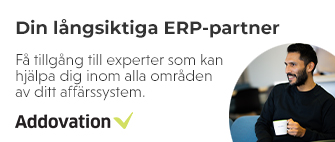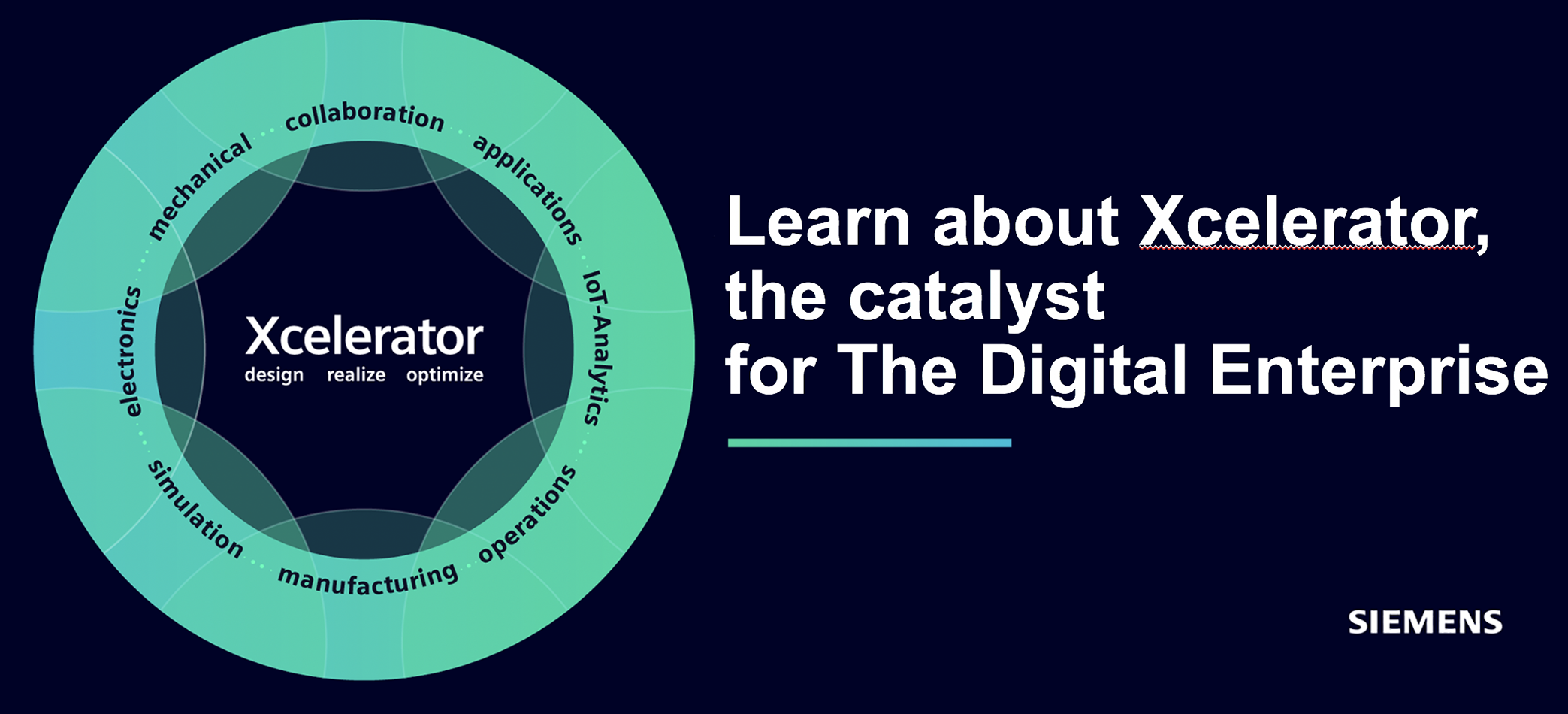What Jair Ribeiro has to say in the AI area is important, not least based on the fact that he previously also led the Volvo Group’s AI & ML Center of Excellence. This position involved identifying and developing AI initiatives aligned to business needs, providing strategic guidance on technology, resources and implementation planning.
His background also includes a global journey that started in Brazil, via Italy then went to IBM and Volvo in Poland and to today’s current job at Volvo Group in Gothenburg, as Analytics and Insights Leader | Data-Driven Innovation, AI Excellence. Here’s the his column:
A Reflection on How Sweden Can Lead in AI Amid Europe’s Struggles
“Born in Brazil, I moved to Europe in 1998, beginning my journey in Italy. It was there that I launched my career in enterprise IT, working for HP Enterprises. Italy was home until 2016, a period filled with growth, learning, and the development of my passion for technology. In 2016, I moved to Poland, where I joined IBM and later the Volvo Group, gaining invaluable experience in a rapidly changing landscape. Then, in 2022, my journey brought me to Sweden, where I took on the Analytics & AI Leader role at Volvo Trucks’ headquarters.
My global journey—from Brazil to Italy, Poland, and now Sweden—has profoundly shaped my perspective on AI, technology, and leadership. Living and working across different European countries has given me a unique appreciation for the challenges and opportunities we face in Europe.
I am also driven by my passion for building a sustainable future through technology, not just for my career but for me as a husband and as a father of 3 beautiful young daughters, who have embarked with me on this journey, and for the communities I have come to cherish. My life and work experiences motivate me to think deeply about the future of AI in Europe and how we can collectively rise to meet the challenges and realize the opportunities ahead.
Having lived in Sweden since 2022 and worked globally as an AI leader at Volvo Group, I can’t help but reflect on the evolving landscape of AI in Europe, particularly in the context of Sweden’s potential and the broader challenges we face as a continent. We are at a pivotal moment where technology, regulation, and leadership must converge to chart a future for European AI that is both globally competitive and uniquely impactful.
To ground this continuous reflection, I have been closely drawn from two significant reports: Mario Draghi’s Competitiveness report and Carl-Henric Svanberg’s (Färdplan för Sverige) AI roadmap.
Mario Draghi, former President of the European Central Bank and former Prime Minister of Italy, is well-regarded for his deep understanding of European economics and global financial systems. His report on European competitiveness highlights the critical gaps in innovation and productivity across Europe.
Draghi emphasizes the need for structural changes to boost growth, suggesting that Europe must align its innovation strategies more closely with the United States and China, which have outpaced the continent in technological development. His insights reflect the policy and economic shifts required to enable Europe to compete in the 21st century.
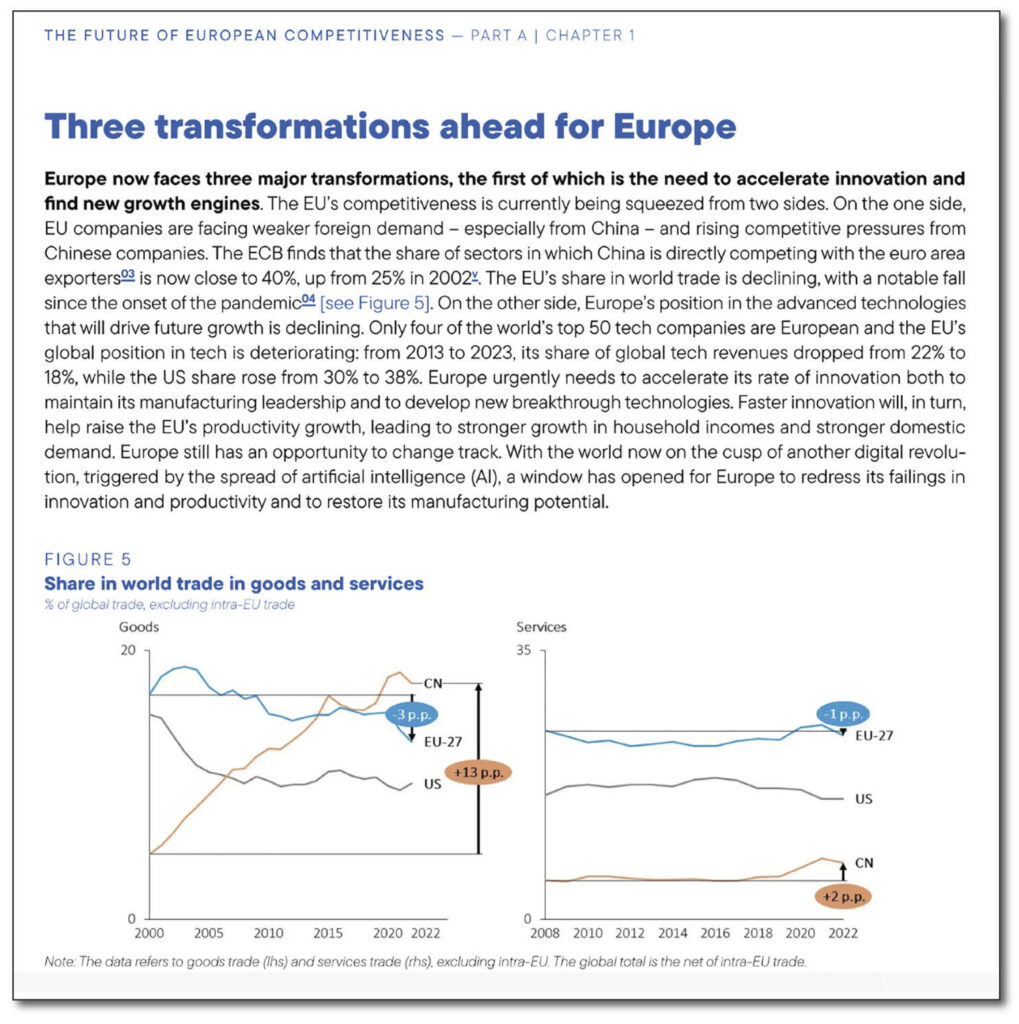
Carl-Henric Svanberg, a prominent Swedish business leader and former Chairman of both AB Volvo and BP, has been instrumental in shaping the discourse on Sweden’s industrial future.
As the head of the Swedish AI Commission, his report presents a roadmap for how Sweden can leverage AI to maintain and enhance its industrial leadership. Svanberg’s deep involvement with industrial giants and his understanding of global markets lend significant weight to his recommendations, which focus on deregulation, fostering collaboration between public and private sectors, and investing in AI education and skills.
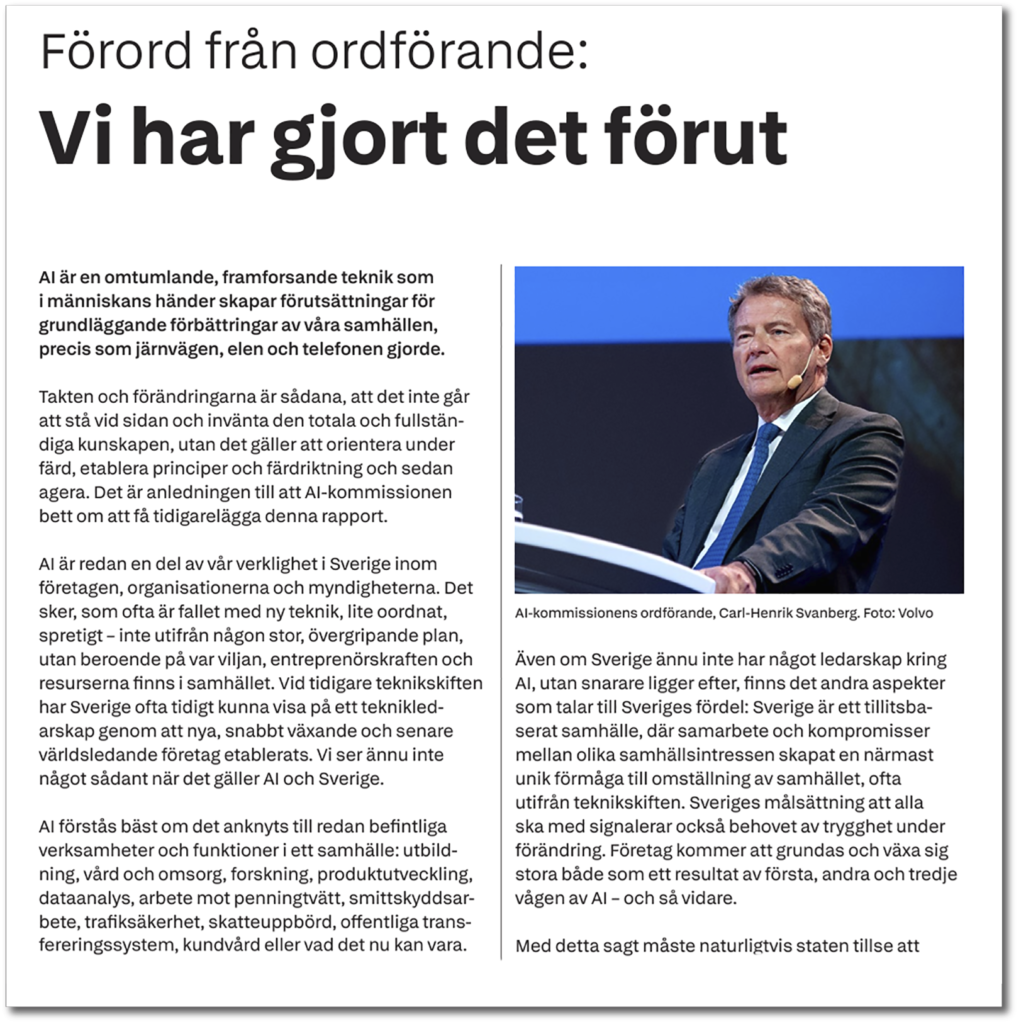
These two reports provide critical context to my constant reflections on the opportunities and challenges for AI in Europe. Their insights help me consider some strategic AI roadmaps I believe we should adopt on many levels to create a more innovative and competitive environment.
Europe’s Current Challenges in AI
Looking closely, Europe’s current standing in the AI arena looks nothing less than stark. Having read Mario Draghi’s competitiveness report with particular attention on when it comes to innovation and technology, and delving most deeply into Carl-Henrik Svanberg’s report, I am well aware of the pressing issues: while we are capable of profound innovation, we struggle with translating that innovation into scale. This gap between invention and commercialization is holding us back. It directly reflects the fragmented regulatory environment and inconsistent support for scaling high-tech ventures across member states.
Unlike in the U.S. and China, where there is a concerted push to foster innovation through regulatory flexibility and a unified approach to venture capital, Europe seems bogged down by its own regulations. Ironically, in my view, the very structures designed to protect us may be stifling our ability to innovate.
Take AI regulation as an example. In the U.S., AI development flourishes largely without strict oversight, creating a dynamic environment that fuels innovation despite inherent risks. Contrarily, Europe imposes extensive regulations, yet its AI ecosystem remains underdeveloped. This interesting paradox—numerous rules but limited AI advancement—reveals a significant misalignment between ambition and action.
In my view, we should confront the reality of navigating the future while relying on an outdated map while this European environment directly impacts companies, particularly those that are naturally risk-averse, significantly hindering their capacity to research, invest in, and implement AI effectively.
The reality is that, if left unchecked, this scenario will see Europe fall further behind. Draghi’s report paints a grim future: with productivity trends stagnating and an aging population, the EU’s GDP in 2050 risks being no more significant than it is today. From what I see, this reflects a need for urgent systemic change. For those of us working in technology and AI, this isn’t just a macroeconomic statistic—it’s a clear signal that the systems we rely on for funding, development, and scaling desperately need reinvention.
Sweden’s Potential to Lead
But my reflection shouldn’t end with challenges. I believe there are significant opportunities that Sweden could seize if we take coordinated action in both the private and public sectors.
If we observe Draghi’s report and, more deeply, Carl-Henrik Svanberg’s insights, which align well with my overall perception as a technological leader and my long-standing life in Europe with a global perspective, I understand that, first, Europe should create a coherent AI strategy that aligns regulatory frameworks across the EU, allowing for the free movement of AI innovation—much like the Schengen Agreement facilitates the free movement of goods and people across European borders.
I envision a sort of ’Schengen for AI,’ where AI research, funding, innovation, and talent can flow seamlessly across European countries without bureaucratic obstacles. By focusing on unified standards and removing bureaucratic fragmentation, we could create a common digital marketplace for AI technologies. This approach would reduce the barriers to entry that currently push our most promising startups to scale in the U.S. instead.
A focal point for European AI growth
I believe in this scenario, Sweden would already have some advantages, that could make us a focal point for European AI growth. The Swedish AI Commission’s recent push for a coordinated, cross-sectoral approach to AI development is a strong starting point. Carl-Henrik Svanberg’s report also emphasizes the need for such coordinated efforts, and it deeply resonated with me, considering my professional journey across multiple European countries and roles in technology.
Sweden’s culture of trust, public-private cooperation, and access to quality data give us a significant edge. Data—the foundation of AI—is abundant here, and with the right regulatory nudges, Sweden could become the European hub for ethical, high-quality AI development. Moreover, the emphasis on an inclusive transformation, where all parts of society benefit from AI, aligns well with the historical Swedish ethos of equity and sustainability.
But let’s not be complacent. I am very used to the fact that sweden always tops several ranks like happiness, innovation, diversity and inclusion, educated population and many other, but it is also true that Sweden ranked 25th in the fifth edition of the Global AI Index, published on 19 September 2024, behind other Nordic countries like Finland and Denmark. This should be a wake-up call for us. In my view, we need a robust approach to AI skills development that extends beyond the tech industry and into every sector.
That’s why I firmly believe and relentlessly work to have AI literacy perceived as fundamental as digital literacy; it’s not just about creating data scientists but equipping every worker with the tools and understanding to engage with AI in meaningful ways. By experience, I believe a society-wide knowledge uplift could be the cornerstone of ensuring that Sweden’s AI journey is inclusive and impactful.
The Role of Leadership and Collaboration
From a business perspective, corporate leaders have a vital role to play in this transition. The success stories from the U.S.—whether it’s Google, Amazon, or Microsoft (which recently announced its largest single investment in Sweden, with plans to spend 33.7 billion SEK in cloud and artificial intelligence (AI) infrastructure over two years, including the training of 250,000 people with AI skills. )—aren’t just about technical prowess; they are about leadership, vision, and an ecosystem that fosters growth.
In Europe, particularly in Sweden, I believe we need more corporate champions who adopt AI and lead the way in ethical, sustainable AI innovation. This is where the initiatives I see under development in my company today, mainly focused on AI-driven operational efficiency and sustainability, can set an example. I see great work that has been done across the whole company in areas like autonomous vehicles, office automation, and many others as something that can clearly serve as a blueprint—showcasing how AI can be integrated responsibly and effectively into legacy industries to drive growth, not replace human jobs but augment them.
Moreover, I see academia as a critical ally in this mission. The intersection of academic research and industrial application is where the magic happens—it’s where fundamental research translates into practical solutions.
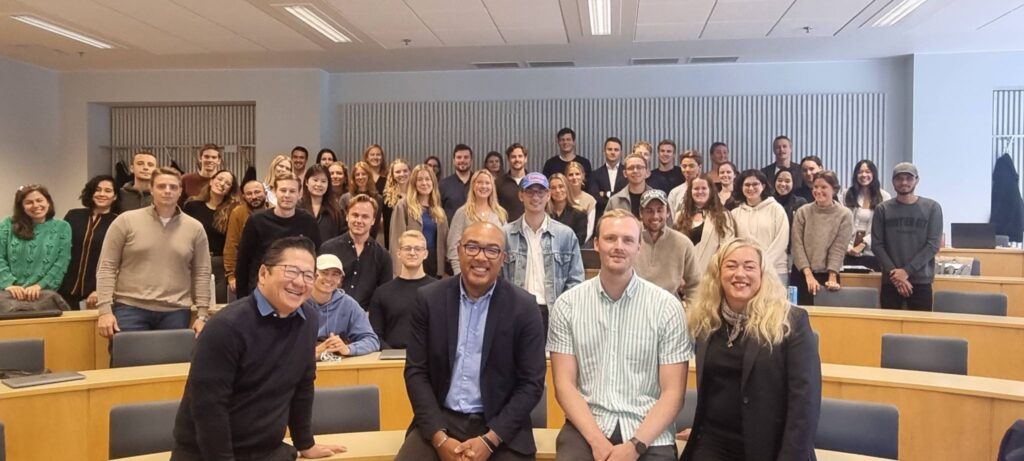
Incubators for AI talen and ideas
Swedish universities, with their strong emphasis on collaborative research and openness, have the potential to serve as global incubators for AI talent and ideas. For example, Chalmers University of Technology is making significant strides in AI research, particularly in the areas of autonomous systems and machine learning. Similarly, Lund University has pioneered AI for healthcare applications, developing solutions that integrate seamlessly with clinical environments.
Also, KTH Royal Institute of Technology is leading initiatives on AI ethics and sustainable technology, creating a solid foundation for responsible AI. We need to bridge the gap between the theoretical and the applied by fostering closer collaborations between universities and industries, ensuring that our brightest minds have the incentives and the means to stay and innovate here in Europe.
Ultimately, in my opinion, the future of AI in Europe hinges on our ability to be bold, to move beyond the fear of the unknown, and to take proactive, unified steps toward creating an ecosystem that champions innovation, inclusivity, and leadership.
We have done it before—as Carl-Henric Svanberg said in his report, which deeply inspired me, we’ve navigated through previous industrial shifts by taking risks and making bold decisions, even when the path wasn’t fully clear. As he also said in a podcast with the European Round Table of Industrialists: ”When you know that the world is going to change, you will embrace change…”
Demanding courage and collective vision
I see AI as the next frontier, demanding the same courage and collective vision from everyone.
As a European tech leader, I remain optimistic. I believe we have the talent, the infrastructure, and the vision—what we need now is the resolve to act decisively and collaboratively. By aligning our strategies, simplifying our regulations, and committing to an inclusive future, I believe Europe, and Sweden in particular, can lead in the responsible use of AI, setting standards that others will follow.
Let’s not let this opportunity slip away. The time for a European AI revolution is now, and it begins with each of us—academia, industry, and government—working together to shape the future we want to see.
By Jair Ribeiro – Analytics & Insights Leader – Volvo Group
The article is also published in English in The AI Enthusiast News – here’s the link:

